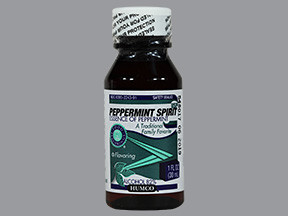PEPPERMINT OIL - ORAL
PHONETIC PRONUNCIATION:
GENERIC NAME(S): peppermint oil
Uses
USES: Peppermint oil has been used for stomach/intestinal disorders (e.g., upset stomach, cramps, irritable bowel syndrome-IBS). This product should not be used in children younger than 8 years. Some herbal/diet supplement products have been found to contain possibly harmful impurities/additives. Check with your pharmacist for more details about the brand you use. The FDA has not reviewed this product for safety or effectiveness. Consult your doctor or pharmacist for more details.
How to use PEPPERMINT OIL - ORAL
HOW TO USE: Take this product by mouth as directed. Follow all directions and warnings on the product package. If you are uncertain about any of the information, consult your doctor or pharmacist. If you are using the capsule form of this product, swallow the capsules whole. Do not crush or chew the capsules. Doing so can release all of the drug at once, increasing the risk of side effects. If you are unable to swallow the capsules, you may open the capsule of some brands and sprinkle the contents onto a spoonful of cool, soft applesauce. Swallow all of the mixture right away without chewing. If your condition persists or worsens, or if you think you may have a serious medical problem, get medical help right away.
Side Effects
Precautions
Interactions
Overdose
Images
Reviews
Faq for PEPPERMINT OIL - ORAL
Peppermint oil is a natural essential oil derived from the peppermint plant (Mentha x piperita) and is commonly used for various purposes including medicinal and culinary applications.
Peppermint oil is often used orally to help alleviate symptoms of indigestion, irritable bowel syndrome (IBS), and other digestive issues. It may also provide relief from headaches, sinus congestion, and nausea.
Peppermint oil can be taken orally by adding a few drops to a glass of water, tea, or in a capsule form. It is important to follow the recommended dosage instructions as excessive use can cause side effects.
Using peppermint oil orally may cause heartburn or worsen symptoms for certain individuals with gastroesophageal reflux disease (GERD). It is also advised to avoid using peppermint oil orally for infants and young children, as it may cause breathing difficulties.
Peppermint oil may interact with certain medications such as antacids, cyclosporine, and certain medications metabolized by the liver. It is recommended to consult with a healthcare professional before using peppermint oil orally if you are taking any other medications.
While peppermint oil is generally considered safe for use, it is advisable to consult with a healthcare professional before using it orally during pregnancy or breastfeeding to ensure individual safety.
Yes, peppermint oil is commonly used as a natural breath freshener due to its refreshing and minty flavor. It can be added to toothpaste, mouth rinses, or even used directly on the tongue.
Disclaimer
IMPORTANT: HOW TO USE THIS INFORMATION: This is a summary and does NOT have all possible information about this product. This information does not assure that this product is safe, effective, or appropriate for you. This information is not individual medical advice and does not substitute for the advice of your health care professional. Always ask your health care professional for complete information about this product and your specific health needs.


No Reviews Yet